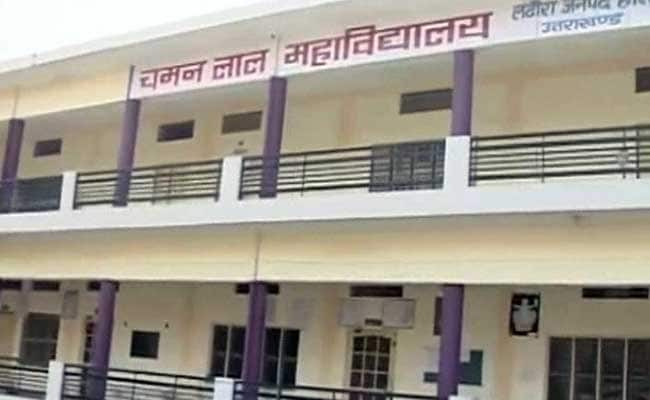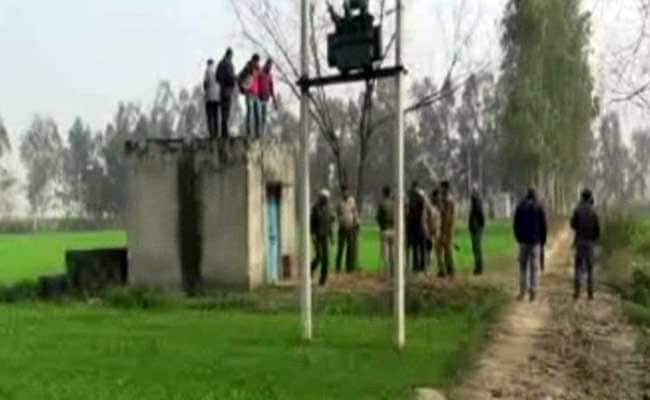Police had arrested four men from Uttarakhand for alleged terror links.
Roorkee:
Sitting on stairs of his house in a nondescript village near Uttarakhand's Roorkee, Nafiz Ahmed, was trying to make sense of the last few hours. On January 19, his 20-year-old son Mohammed Osama didn't return from his tuition classes. His phone was switched off and no one knew his whereabouts. Later that night, the Delhi Police called to say Osama was arrested for planning to blow up trains and trigger explosions at the Ardh-Kumbh mela.
"How could he get mixed up with this?" he asked. A small group had gathered at his house. But the narrow lanes of the village were largely empty. The next day, he was allowed to meet Osama at the Special Cell office in Delhi. "Osama just looked down at the floor and said nothing," Mr Ahmed recounted.
Everyone in the village remembered Osama as courteous, studious and religious young man with a lot of friends. "He was normal boy, with normal aspirations - a job as civil servant and a peaceful life. Osama was planning to take his civil service exams," his father said.

Osama was studying Political Science, History and Geography at the nearby Chamalal University. "He was regular, participated in class, and did his lessons well. He never got into fights. I am not sure what went wrong with him," R K Sharma, director of College who knew Osama said.
Jorasi is a village of nearly 12,000 people. Mostly farmers but wealthy. Mr Ahmed owns tractors and electric tube wells that irrigate his 40 acre farm. Osama and his brothers and sisters were well provided for.
A team of the Delhi Police reached Landoria village with Mehraj, another 20-year-old, a friend of Osama who was also arrested on the January 19 for similar reasons. Osama and Mehraj were friends and were often seen together as were Aklaq Ur Reham and Mohammed Azim Shah. All of them were arrested on January 19.
In two years, Mehraj would have become a qualified Ayurveda doctor. The first thing that police took away from him was his laptop and his mobile phone. Both, they say, are vital for the investigations. It is through the internet that terror handlers got in touch with these boys and allegedly radicalised and motivated them to plan an attack on the Ard Kumbh.

"I asked him what was in the laptop when I met him at the Lodhi Road Police Station on January 20 but he didn't answer, I really do not know what it had and how something on the laptop could be used to carry out an attack," Sartaz - Mehraj's elder borther - said.
Like Osama, Mehraj's teachers too remember him as a normal boy.
"He cleared senior school from here, he was ordinary boy, neither good nor bad in academics," Kuldeep Kaushik the Chairperson of Himigiri Advance Studies & Sports Centre said. She had taught Mehraj for about two years.
For the residents of Jorasi and Landoria the fact that nothing incriminating - like weapons, explosives- was found on any of the four boys is odd and proof of their innocence. Security agencies, however, say there is enough evidence in the cyber world of their intention to carry out strikes. Terror has a new weapon: the internet.
"How could he get mixed up with this?" he asked. A small group had gathered at his house. But the narrow lanes of the village were largely empty. The next day, he was allowed to meet Osama at the Special Cell office in Delhi. "Osama just looked down at the floor and said nothing," Mr Ahmed recounted.
Everyone in the village remembered Osama as courteous, studious and religious young man with a lot of friends. "He was normal boy, with normal aspirations - a job as civil servant and a peaceful life. Osama was planning to take his civil service exams," his father said.

Osama was studying Political Science, History and Geography at the nearby Chamalal University. "He was regular, participated in class, and did his lessons well. He never got into fights. I am not sure what went wrong with him," R K Sharma, director of College who knew Osama said.
Jorasi is a village of nearly 12,000 people. Mostly farmers but wealthy. Mr Ahmed owns tractors and electric tube wells that irrigate his 40 acre farm. Osama and his brothers and sisters were well provided for.
A team of the Delhi Police reached Landoria village with Mehraj, another 20-year-old, a friend of Osama who was also arrested on the January 19 for similar reasons. Osama and Mehraj were friends and were often seen together as were Aklaq Ur Reham and Mohammed Azim Shah. All of them were arrested on January 19.
In two years, Mehraj would have become a qualified Ayurveda doctor. The first thing that police took away from him was his laptop and his mobile phone. Both, they say, are vital for the investigations. It is through the internet that terror handlers got in touch with these boys and allegedly radicalised and motivated them to plan an attack on the Ard Kumbh.

"I asked him what was in the laptop when I met him at the Lodhi Road Police Station on January 20 but he didn't answer, I really do not know what it had and how something on the laptop could be used to carry out an attack," Sartaz - Mehraj's elder borther - said.
Like Osama, Mehraj's teachers too remember him as a normal boy.
"He cleared senior school from here, he was ordinary boy, neither good nor bad in academics," Kuldeep Kaushik the Chairperson of Himigiri Advance Studies & Sports Centre said. She had taught Mehraj for about two years.
For the residents of Jorasi and Landoria the fact that nothing incriminating - like weapons, explosives- was found on any of the four boys is odd and proof of their innocence. Security agencies, however, say there is enough evidence in the cyber world of their intention to carry out strikes. Terror has a new weapon: the internet.
Track Latest News Live on NDTV.com and get news updates from India and around the world

